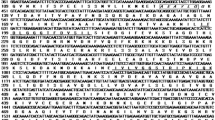Abstract:
All organisms show a common defensive mechanism that results in the expression of conserved heat shock proteins (Hsps). These proteins function in a wide range of stressful conditions. We have monitored their levels in species of regenerating echinoderms with different mechanisms of regeneration and from different geographical locations. The effect of an artificial higher temperature on expression of Hsps was also studied. Two stress proteins (Hsp72 and ubiquitin) that are important in processes such as development and protein degradation were investigated. Using Western blot analysis and immunocytochemistry, we found significant changes in the level (Hsp72) and pattern of conjugation (ubiquitin) that corresponded with the repair phase (early regenerative stages) and with the later growth and regeneration of new tissues. Animals from the intertidal environment showed a distinctly sustained expression pattern of Hsp72 compared with benthic animals which suggests a functionally adaptative and dynamic stress response program.
Similar content being viewed by others
Author information
Authors and Affiliations
Additional information
Accepted March 1, 2000.
Rights and permissions
About this article
Cite this article
Patruno, M., Thorndyke, M., Candia Carnevali, M. et al. Changes in Ubiquitin Conjugates and Hsp72 Levels During Arm Regeneration in Echinoderms. Mar. Biotechnol. 3, 4–15 (2001). https://doi.org/10.1007/s101260000018
Issue Date:
DOI: https://doi.org/10.1007/s101260000018




